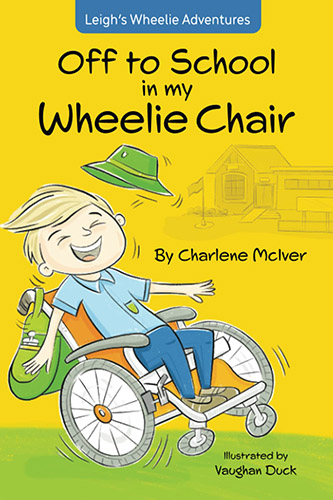
The boy in the story sets off to school independently in his manual wheelchair. He is quite clearly proud of his ‘awesome wheelie chair’: the story (written in rhyme) begins with the boy pointing out its features and benefits. His journey is not without challenges; he has to negotiate obstacles (bumps, cracks, gravel and hills slow him down, and he has to avoid hazards and take care around faster moving vehicles like racing cyclists). It’s not all challenging, though: after a tough climb uphill, the boy clearly loves feeling the wind in his hair and whizzing back down again (‘Rolling, rolling – it’s such an amazing feeling’). On arrival at school, the boy socialises with his friends and is ‘ready, willing and able’ to get the most out of his day.
Vaughan Duck’s greyscale charcoal illustrations compliment the story well and show the contrasting emotions of the boy (we really liked the positive image of the boy laughing and enjoying receiving an almighty splash from a puddle!)
This positive picture book would be a great way to explore how we all could be more considerate and supportive to anyone who has mobility issues or other special needs, encouraging children to empathise and act with kindness and thoughtfulness. Children who are wheelchair users themselves may recognise aspects of their own lives in the book and enjoy the positive viewpoint as well as an engaging story.
 A light-hearted and engaging picture book that focusses on a young boy’s journey to school in his manual wheelchair. The story gives a very positive view of wheelchair use, emphasising that it can be fast and fun, while at the same time making the reader more aware of the challenges and obstacles that wheelchair users face each day. Promotes resilience, kindness and acceptance.
A light-hearted and engaging picture book that focusses on a young boy’s journey to school in his manual wheelchair. The story gives a very positive view of wheelchair use, emphasising that it can be fast and fun, while at the same time making the reader more aware of the challenges and obstacles that wheelchair users face each day. Promotes resilience, kindness and acceptance. 

